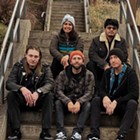Jim Boyd has a great job. He gets to write, play, record and market his own music for a living. But he sure didn't arrive at that position overnight. In fact, Boyd's journey from a 12-year-old kid with his first guitar to a singer/songwriter in demand from coast to coast was a long one, characterized as much by frustration and self-doubt as success.
With patience, perseverance and luck, Boyd has triumphed. His successes include a six-album discography (2001's alterNATIVES took Record of the Year honors at last year's Native American Music Awards), a collaboration with writer Sherman Alexie on the soundtrack for the film, Smoke Signals (Boyd also performs with Alexie at various multimedia productions and benefit concerts) and packed houses wherever he performs. He unveils his new band, Kyo-T (with bassist Marty Meisner, drummer Alfonso Kolb and keyboardist Brad Greene), on Monday night at the Met.
Though he spends a great deal of time in Spokane and performs all over the country (and in Switzerland, of all places), Boyd -- a member of the Lakes Band of the Colville Confederated Tribe -- considers Inchelium home and maintains his Thunderwolf Records recording studio there. His childhood was divided between life on the reservation and life on various Air Force bases around the country. As a teenager, he taught himself to play guitar. As a young man, he worked in construction during the day and played gigs in various bands around the reservation at night. For years, he performed mostly in cover bands and never considered the idea of a serious musical career as much more than a daydream.
"Before 1992, I was more a musician and a singer," he says. "I wasn't worried about issues. I used to drink. Then a lot of things happened all at once. I met Sherman (Alexie), I quit drinking and I ended up writing about issues and things I was working on in my own life."
Alexie, a fellow Indian with a successful career in the arts, was a huge inspiration to Boyd, who began focusing on lyrics and stripping his music down to the bare essentials.
"A lot of the stuff he did really impacted me," says Boyd. "I was coming from really low self-esteem and not thinking that anybody would have an interest in anything I had to say. Then I saw this Indian guy out there kicking major butt, you know, all over. Timing-wise, it was great for me. The first time we met, he told me he was a fan of mine, and I thought, 'Wow. That's pretty weird.' "
From there, Boyd's career took off. He took a class in business management and applied his newfound knowledge to his music career. Balancing the business concerns of his own record label with his artistic aspirations, he was able to express himself creatively while controlling the production and marketing of his art.
But Boyd has had trouble over the years maintaining a stable group of musicians to help him realize his musical vision. Though the assembly of Kyo-T was partly a chance occurrence, the desire to form a new band was born out of necessity as his former group, Rez Bound, was fragmenting.
"Last year, I was having a pretty rough time with the timing," he says. "A lot of cool things were happening, but two members of my group were living in Olympia. I was writing a lot and couldn't get them together to learn the new material. Finally, it just got so frustrating, I basically said to hell with it. This year was just the opposite. I found a studio that I love [Black Coffee Recording], and I've got a new band."
The genesis of Kyo-T was as happily unexpected as it was rapid. It all started when Boyd went into the studio with Kolb playing drums. The two of them cranked out the basic tracks to 11 songs in a single day and were getting ready to add bass and keyboards when Boyd ran into Marty Meisner, formerly of the Mayfield Four.
"He said wanted to play some bass for us for the CD, so we got him in there. Then he decided to stick with it."
Boyd says Kyo-T keyboardist Brad Greene also sort of stumbled into the group.
"We were in there recording one day and this guy comes in to schedule some recording time for himself and he says, 'Are you Jim Boyd? I played keyboards on your album last year.' It turned out he had played the keyboard part on a duet I had recorded for the alterNATIVES CD in North Dakota. I had always loved that piano part, but I didn't know Brad was from here. And here I was meeting him in Spokane in the studio. He's in the band now."
Boyd says the new material (available in album form by the end of April) is musically unlike anything he's ever done.
"I'm very, very excited about it. The stuff I've done before is more folk rock. Now we've got a more rhythm-and-blues thing going on with harmonica and horns. And even though it's bluesy, a lot of the songs are about not drinking -- totally different from the normal blues type of thing."
The new music, whatever genre it happens to fall into, is informed by the same experiences that characterize all of Boyd's work. Experiences on the rez. Experiences out in the world. Whether addressing the internal or the external, his songs contain a mix of personal and political themes. Yet for Boyd, the political is personal.
"When I was working on my personal issues, I began to realize that politics was a part of all of them," he says. "There was no getting around it. So a lot of my music is therapy for myself. I think about things, and I get pissed off, so I write a song, get it out of my system and sometimes move on. Or try to move on."
Fight the Power -- Two spoken-word shows by two of the most riveting speakers ever to nuzzle a microphone (both ex-leaders of their own highly influential punk bands) both in Spokane and both during the same week? What strange timing. But that's what's going down at the Met this week, with appearances by Henry Rollins (on Friday -- see story on page 23) and JELLO BIAFRA (on Tuesday).
Biafra didn't set out to become a political activist. That role was thrust upon him in 1986 when he found himself having to defend his First Amendment rights during the infamous Frankenchrist obscenity trial. There, as leader of the San Francisco punk band the Dead Kennedys, Biafra and four others (the first citizens in American history to face criminal charges over a recorded work) eventually beat the rap that the phallocentric artwork included with the album constituted "Harmful Matter to Minors" -- a charge spearheaded by everyone's favorite swarm of bored, self-important housewives, the censorship-happy PMRC. The trial ended in a hung jury and the charges were dropped.
The Dead Kennedys called it quits later that same year after releasing the appropriately titled Bedtime for Democracy. But for Biafra (head of the Alternative Tentacles record label and former San Francisco mayoral candidate), things were just getting interesting. He took to the road, vigorously championing individualism and freedom of expression while blasting -- with equal parts vitriol and humor -- government and corporate corruption (the same thing, really), along with stupidity, apathy and greed. He's yet to slow down. In fact, next week's performance -- a fund-raiser for two very worthy local groups, the Lands Council (www.landscouncil.org) and Thin Air Community Radio (www.thinair.org) -- is part of a national tour heralding the release of Biafra's new spoken-word album, Machine Gun in the Clown's Hand.
Ah yes, in these days of "with us or against us" faux patriotism (among many other evils), Biafra's impassioned defense of civil liberties and informed take on the current state of the planet is just the thing to clear out all that fuzzy doublespeak and get things back to basics. It should, in fact, make for a rather stimulating evening.
Son of Masterworks -- Once again, Spokane's own masters of jazz are assembling under the direction of Maestro Gunther Schuller for a night of Big Band music so authentic you'll need a digital watch to tell you what year it is. This Saturday, the SPOKANE JAZZ ORCHESTRA, with Schuller at the helm, presents the second of its two-part "Masterworks" series with the stuff that everybody really digs, Big Band. And nothing but the big names: Ellington, Basie, Hampton, Goodman, James and more -- the very same guys (and the very same hits) responsible for turning this uniquely American musical form into the most popular music of a generation.
The years you'll be visiting via brass, reeds and strings are the mid-1930s through the early 1950s. And nobody is better equipped to be your tour guide than the collected body of the SJO, currently celebrating its 28th season. SJO Music Director Dan Keberle will be featured on several trumpet solos. And Schuller? Well, you read this paper often enough to know that the Maestro's years of dedication to jazz performance, instruction and academia imparts an unmatched level of authenticity and sophistication to the proceedings.
Publication date: 03/06/03















